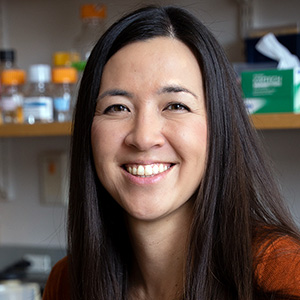Lipids and membranes
Lipids are fundamental building blocks of life. Their unique chemical properties drive many core cellular processes. Their self-organization in the aqueous environment enables membrane-bound cells to exist and facilitates organelle compartmentalization. They are an exquisitely high-yield energy source, which is both efficiently stored, highly stable and rapidly mobilized. Their vast array of unique chemical configurations enables them to function as both first and second messenger molecules.
Dysfunction of lipid abundance and signaling is a hallmark of metabolic diseases including Type 2 diabetes, cardiovascular disease, cancer and neurodegenerative disease. Understanding both the basic and disease-driving function of lipids is important to establish cellular regulation and disease etiology.
Organizers

Gerry Hammond
University of Pittsburgh

Judith Simcox
University of Wisconsin
Symposia
New frontiers in inositol lipid signaling
- Lipid switches in cell physiology: From nutrient signals to disease
Volker Haucke, Leibniz Forschungsinstitut für Molekulare Pharmakologie - The sub cellular landscape of PI3K activation at single molecule resolution
Gerry Hammond, University of Pittsburgh - PI3K signaling in health and disease: New twists and turns
Ralitsa Madsen, University of Dundee - Phosphoinositide signaling as a dynamical system
Min Wu, Yale University
Emerging roles for lysosomal lipids in metabolic disease
- Mechanisms and physiology of lysosomal lipid degradation
Robert Farese, Memorial Sloan Kettering Cancer Center - Lysosome cholesterol sensing in growth regulation
Hijai Shin, University of Texas Southwestern Medical Center - Novel regulators of lysosomal lipids and their role in neurodegeneration
Monther Abu-Remaileh, Stanford University - Lipid trafficking in Parkinson’s Disease
Suzanne Pfeffer, Stanford University School of Medicine
Novel insights into neurodegeneration from lipid biology
- Lipid mediators of Alzheimer's disease: A tale of mice and men
Judith Simcox, University of Wisconsin–Madison - Lipid signaling in neurodegeneration
Eamonn Dickson, University of California, Davis - Mitochondrial quality control in neuronal homeostasis and neurodegenerative disease
Chantell Evans, Duke University - The lipidome landscape in models of Niemann-Pick Type C
Stephanie Cologna, University of Illinois at Chicago
Other sessions
These sessions and activities will also be of interest. See the full program schedule for details on these and the rest of the ASBMB Annual Meeting.
Featured speakers
- Persistence and serendipity in science: a poker analogy
Melissa J. Moore, University of Massachusetts Chan Medical School - Novel GABA aminotransferase and ornithine aminotransferase inactivators as potential new treatments for epilepsy, pain and hepatocellular carcinoma
Richard Silverman, Northwestern University - Functional analysis of intracellular lipid-binding proteins
Judith Storch, Rutgers University - The contribution of fatty acid oxidation to diet-induced hepatocellular carcinoma
Robert N. Helsley, University of Kentucky College of Medicine
Meetups
- Glycobiology and extracellular matrices
- Industry scientists and industry interest
- Lipids and membranes
- Neurobiology
Interest group sessions
Workshops
Poster sessions
- Glycobiology and extracellular matrices
- Lipids and membranes
- Neurobiology
Events
- ASBMB welcome address
- Career and education fair
- Emerging investigator seminar
- Undergraduate poster competition




